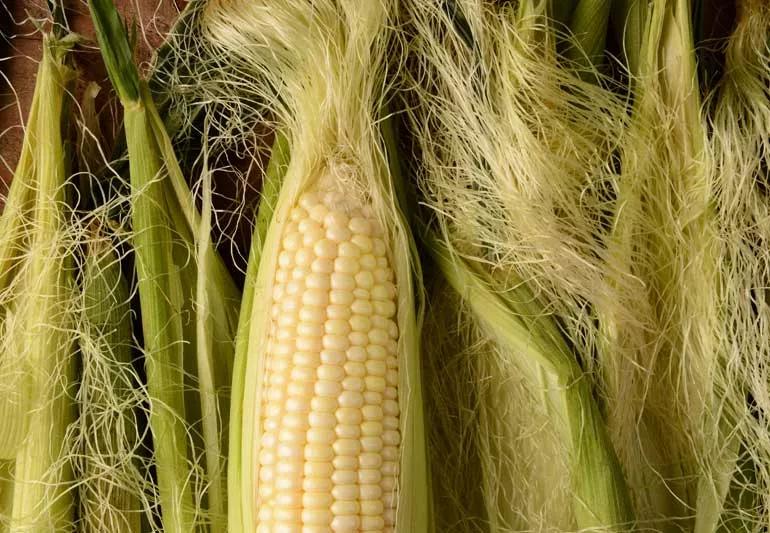These silky strands can reduce cholesterol and inflammation, and more

If you’re like most people, you toss corn silk straight into the compost bin or trash. These silky threads that cover ears of corn can be a nuisance to remove — from the cob, your hands and your teeth.
Advertisement
Cleveland Clinic is a non-profit academic medical center. Advertising on our site helps support our mission. We do not endorse non-Cleveland Clinic products or services. Policy
But Native Americans and people in China, Turkey and other countries think differently about corn silk. For centuries, they’ve been using corn silk as an herbal remedy for medicinal purposes. Today, corn silk — and products like corn silk tea and supplements — are growing in popularity. Registered dietitian Susan Campbell, RD, LD, explains why you might want to keep (and not trash) corn silk the next time you’re husking corn.
Corn silk (Stigma maydis) is the layer of glossy, thread-like strands found between the corn husk and ear. An ear of corn may have 300 to 600 corn silks. They’re a key part of the vegetable’s reproductive system and essential to crop pollination. The fibers trap the pollen that fertilizes the cob and helps kernels grow. Along with the husk, corn silk also protects kernels, helping the ear of corn retain its moisture and sweetness.
Studies show that corn silk contains:
Despite centuries of herbal remedy use, there are limited studies on the health benefits of corn silk. Much of the existing research took place on animals and not humans. Still, certain studies suggest that consuming corn silk and related products may be good for your health.
Advertisement
Four benefits of corn silk for your health include:
Corn silk extract can act as a powerful diuretic, making you pee more. “Increased urine flow can prevent the buildup of bacteria that leads to urinary tract infections (UTIs) and bladder infections,” says Campbell. And if you do get a UTI or bladder infection, corn silk extract soothes inflammation to ease pain.
Increased urination can also help strengthen your bladder. Healthcare providers sometimes recommend corn silk extract or teas for children experiencing bedwetting and adults with urinary incontinence. Corn silk may also prevent kidney stones and protect against kidney damage caused by certain medications or cancer treatments.
The diuretic properties of corn silk may also lower blood pressure. But Campbell cautions that people who already take diuretics or blood pressure medicine may be at risk for losing too much potassium. This could lead to low blood potassium levels or hypokalemia. “Low potassium is concerning because it can affect the way your heart beats,” says Campbell. “It’s always important to check with your healthcare provider before taking a supplement.”
The plant pigment or flavonoid that gives corn silks their light green, yellow, brown or red colors is also an antioxidant. In fact, corn silk has as much antioxidant value as vitamin C. “Antioxidants protect against inflammation and the effects of aging, as well as diseases like cancer and diabetes,” notes Campbell.
Corn silk extracts are part of Native American and traditional Chinese medicine for diabetes management. The extract may lower blood sugar levels and help prevent complications like diabetes-related neuropathy (nerve damage), according to one study. Other studies indicate that corn silk extracts may slow your body’s absorption of starchy foods, preventing spikes in blood sugar.
But if you’re already taking medications to lower your blood sugar, Campbell advises checking with your provider before beginning to take a supplement. “Blood sugar that is too low can be dangerous, too.”
The flavonoids in corn silk may improve your cholesterol numbers by lowering triglycerides and low-density lipoproteins (LDL). “These unhealthy forms of cholesterol cause plaque deposits to form inside your arteries, increasing your risk of heart attacks and strokes,” Campbell explains.
Yes! Corn silk has a mild taste and a sweetness you would expect from corn. You can save the silks after husking and use them fresh as a topping on salads, potatoes, soups, tacos and more. You can also dry and store corn silk for up to one year.
To dry corn silk:
Advertisement
To make corn silk tea:
Healthcare providers don’t know much yet about the risks of consuming corn silk or products like teas and supplements. Check with your healthcare provider before taking a corn silk supplement, as there currently isn’t a recommended dosage. Dosage amounts typically vary depending on a person’s sex, age, weight, medications and health issues.
For now, Campbell advises against adding corn silk to your diet if you’re pregnant, breastfeeding or taking medications such as:
But for many people, corn silk can add a healthy, fresh twist to your favorite dishes. So, don’t throw away those corn silks. Save them for your next tea, salad or smoothie!
Advertisement
Learn more about our editorial process.
Advertisement

The tropical fruit is a good source of antioxidants and vitamin C

High amounts of cholesterol and saturated fat in red meat may be linked to heart disease

The leaves and pods from this tree are rich in essential nutrients

This starchy root vegetable is a staple in many global cuisines — but it has to be prepared correctly, or it can cause serious concerns

These delicate green sprouts can give you an extra dose of vitamin K and other nutrients — but they’re not safe for everyone

Edamame, lentils and chicken breast are good sources of protein

Eating this root vegetable can help support your eye, heart and brain health

The flavorful herb is full of antioxidants that may help regulate blood sugar

The tropical fruit is a good source of antioxidants and vitamin C

Most people fall asleep within 10 to 20 minutes, but if your experience is different, adjusting your sleep schedule may help

Exploring your hidden side can lead to better understanding of what makes you tick